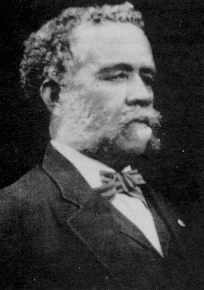 William F.
Yardley was one of Tennessee's most outspoken citizens and colorful public
officials during Reconstruction times. He was elected to the Knoxville
Board of Aldermen, 1872-l873, and to the Knox County Court, 1876-1882.
He was a Republican candidate for governor of Tennessee in 1876.
William F.
Yardley was one of Tennessee's most outspoken citizens and colorful public
officials during Reconstruction times. He was elected to the Knoxville
Board of Aldermen, 1872-l873, and to the Knox County Court, 1876-1882.
He was a Republican candidate for governor of Tennessee in 1876.
Born to a white mother and a black father on January 8, 1844, in Knox County, he was literally left on the doorstep of the white Yardley family, who took him in and gave him their name. At an early age he was apprenticed to Squire McClannahan to learn a trade and to read and write. By 1869, Yardley was teaching young black children at the Ebenezer School in west Knox County. He studied law books, read law with a white lawyer, passed the bar, and was licensed to practice law. He became Knoxville's first black lawyer in 1872 at age twenty-eight.
It was during the gubernatorial race of 1876 that Yardley made his reputation as an orator. He was hailed by newspapers across the state for his speech-making abilities on the political trail. He advocated change in the common carrier law, which caused a poor man to pay first class fare and ride second class. He fought the privilege tax on dogs, which was a burden on the poor. He advocated sweeping changes in the labor laws. The election was held on November 7, l886, and Yardley came in a poor fourth in the four-man race. Some black Republican party brokers, led by Nashville's Randal Brown, opposed Yardley's candidacy because he ran as an independent. Yet, from that day on, people in Knoxville fondly referred to him as "Governor Yardley."
He was considered the dean of the black lawyers in Knox County and taught many aspiring attorneys. He was a member of Knoxville's first fire department and its second assistant chief during 1876-l877.
Partial to wearing Prince Albert coats and derby hats, he represented the Continental Insurance Company of New York and maintained a law office near the heart of downtown Knoxville. Known as an able criminal lawyer "with a quick wit and eloquent speech," he was characterized by Frederick Douglass, who had been his house guest, as "One of the most remarkable men that I have met."
In 1870, Yardley married Elizabeth Stone, a native Knoxvillian, who was part American Indian. They had four children. During their golden wedding anniversary celebration in 1920, many prominent citizens, including the mayor and other city officials, attended.
In 1878, Yardley was the publisher and editor of Knoxville's first black newspaper, the Knoxville Examiner. In 1882, he organized and published another newspaper, the Knoxville Bulletin.
William Francis Yardley died on May 20, 1924.